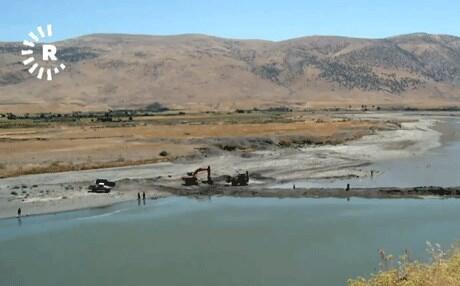A local official announced on Monday that Iran has decided to release water flow into the Kurdistan Region, after blocking a river flow last week. Mayor of Pishdar district, Bakir Baiz, told Rudaw that they were informed by the mayor of Sardasht, Aghai Jahani, “that a segment of the Zei Bchuk [Little Zab] river will be released, which had been stored by Kolsa dam in Sardasht.” He added that “the restoration of the water will continue and will not be stopped again.” The construction of a dam on Zei Bchuk river in Iran’s Kurdish city of Sardasht to produce hydroelectric power resulted in the stem of water flow into Kurdistan Region’s border town Qaladze, resulting in an 80 percent reduction of water flow into the Khas water project and depriving 80,000 people of water. Kurdistan’s agriculture minister had threatened to cut off water to central and southern Iraqi provinces if Iran continued to stem the flow of water into the Kurdistan Region’s border town of Qaladze. “We have warned Iraqi high-ranking authorities that if Iran stems the flow of any two cubic meters water into the Kurdistan Region for whatever reason, we will in return stem a cubic meter water into southern Iraq in order to provide necessary water to the Kurdistan Region,” Abdulstar Majeed, minister of the Kurdistan Regional Government’s (KRG) Agriculture and Water Resources, told Turkey’s state-run Anadolu Agency. In Kirkuk, a number of political parties and civil society organizations gathered to demand Iranian authorities restore the water that has flowed for thousands of years. “The water resources of Kirkuk come from it [Zei Bchuk]. Not only Kirkuk, but also many areas in the Kurdistan Region,” a protester told Rudaw. He said they were asking Kirkuk and Kurdistan Region authorities to “call on the Islamic Republic of Iran to end this act as it will lead to environmental disasters.” Iranian President Hassan Rouhani said on Monday the region is a “family” and should solve problems like dam construction while weighing its impact. “Regional and international organisations should not be indifferent to environmental damages in Iraq and Iran caused by dam construction in neighbouring countries,” Rouhani said on Monday at the International Conference on Combating Sand and Dust Storms. “The important region of Middle East and West Asia is a family,” said the President of the Islamic Republic. “We must aim at having a more powerful region instead being the most powerful country in the region.” Although Rouhani did not explicitly mention Turkey, Ankara has built 19 dams on the Tigris and Euphrates rivers in recent decades, and has plans for three more. “Building dams without studying environmental aspects is damaging for the region,” he said. Pishdar mayor Bakir Baiz warned people nearby the river of the return of the massive water flow once it is released. The river also feeds Dukan Lake. Compared to last year, Dukan Lake’s water level has dropped by some 18 percent, largely due to the impact of the stemming of water flow from Zei Bchuk into the lake, according to figures from Hama Tahir Jalal, manager of Dukan Dam. Majeed said that the waters of Dukan Lake benefit southern Iraqi provinces as well as the Kurdistan Region. The minister had previously told Rudaw that the Kurdistan Region has 17 small and medium sized dams to preserve water for irrigation and drinking, and that they will hopefully prevent any water shortages in the future.
Source: http://bit.ly/2sHId2N











